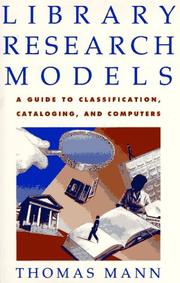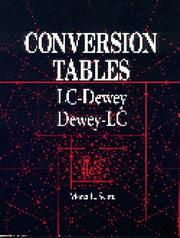| Listing 1 - 10 of 26 | << page >> |
Sort by
|
Book
ISBN: 0471580643 Year: 1993 Publisher: New York [etc.] J. Wiley
Abstract | Keywords | Export | Availability | Bookmark
 Loading...
Loading...Choose an application
- Reference Manager
- EndNote
- RefWorks (Direct export to RefWorks)
Book
ISBN: 2130680046 Year: 1993 Publisher: Paris cedex 14 (Humensis 170 bis, boulevard du Montparnasse 75680) : Presses Universitaires de France,
Abstract | Keywords | Export | Availability | Bookmark
 Loading...
Loading...Choose an application
- Reference Manager
- EndNote
- RefWorks (Direct export to RefWorks)
Cette édition numérique a été réalisée à partir d'un support physique, parfois ancien, conservé au sein du dépôt légal de la Bibliothèque nationale de France, conformément à la loi n° 2012-287 du 1er mars 2012 relative à l'exploitation des Livres indisponibles du XXe siècle. Cet ouvrage fouille les doctrines et les programmes de la deuxième Internationale et débouche sur une réflexion théorique portant sur les notions de mythe et d'utopie, sur le caractère antinomique des idéologies modernes et sur la nature de la foi militante. « Copyright Electre »
Book
Abstract | Keywords | Export | Availability | Bookmark
 Loading...
Loading...Choose an application
- Reference Manager
- EndNote
- RefWorks (Direct export to RefWorks)
Manuscripts --- -Catalogs --- Library of Congress --- Catalogs.
Book
ISBN: 8480939591 Year: 1993 Publisher: Sevilla Secretariado del XLV Congreso Eucarístico Internacional
Abstract | Keywords | Export | Availability | Bookmark
 Loading...
Loading...Choose an application
- Reference Manager
- EndNote
- RefWorks (Direct export to RefWorks)
Lord's Supper --- Congresses --- International Eucharistic Congress
Book
Year: 1993 Publisher: Cambridge, Mass. London Harvard University Press
Abstract | Keywords | Export | Availability | Bookmark
 Loading...
Loading...Choose an application
- Reference Manager
- EndNote
- RefWorks (Direct export to RefWorks)

ISBN: 084440764X 0160416531 Year: 1993 Publisher: Washington Library of Congress
Abstract | Keywords | Export | Availability | Bookmark
 Loading...
Loading...Choose an application
- Reference Manager
- EndNote
- RefWorks (Direct export to RefWorks)
Documentation and information --- United States --- Library of Congress --- History --- National libraries --- United States of America
Book
ISBN: 0844408018 Year: 1993 Publisher: Washington Library of Congress
Abstract | Keywords | Export | Availability | Bookmark
 Loading...
Loading...Choose an application
- Reference Manager
- EndNote
- RefWorks (Direct export to RefWorks)
Music --- Performing arts --- Library resources --- Library of Congress. --- Performing Arts Library (Washington, D.C.)

ISBN: 0195081900 019509395X Year: 1993 Publisher: Oxford Oxford University Press
Abstract | Keywords | Export | Availability | Bookmark
 Loading...
Loading...Choose an application
- Reference Manager
- EndNote
- RefWorks (Direct export to RefWorks)
Library research --- Bibliografische opzoekingen --- Catalogage par matieres --- Catalogisering [Onderwerps] --- Catalogisering [Trefwoord] --- Classificatie van de Library of Congress --- Classification [Library of Congress ] --- Classification de la Library of Congress --- Data retrieval --- Data storage --- Demande d'information --- Dépistage de l'information --- Information -- Dépistage --- Information -- Recherche --- Information retrieval --- Information storage and retrieval --- Informations -- Recherche --- Least effort principle (Psychology) --- Onderwerpscatalogisering --- Onderwerpsontsluiting --- Principe du moindre effort (Psychologie) --- Principe van de minste inspanning (Psychologie) --- Recherche bibliographique --- Recherche d'information --- Recherche de l'information --- Repérage de l'information --- Retrieval of information --- Searching [Bibliographical ] --- Subject cataloging --- Subject headings [Library of Congress ] --- Trefwoordcatalogisering --- Trefwoorden [Library of Congress ] --- Vedettes-matiere de la Library of Congress --- Classification, Library of Congress --- Research --- Searching, Bibliographical --- Subject headings, Library of Congress --- Classification de la Bibliothèque du Congrès --- Recherche --- Recherche documentaire --- Analyse documentaire --- Vedettes-matière de la Library of Congress --- Methodology --- Méthodologie --- -Subject headings, Library of Congress --- -#A9404A --- LC subject headings --- LCSH (Library of Congress subject headings) --- Library of Congress subject headings --- Subject headings --- Subject analysis --- Cataloging --- Content analysis (Communication) --- Indexing --- Psychology --- Library of Congress classification --- Classification --- Library skills --- Library use skills --- Bibliography --- Books --- Classification de la Bibliothèque du Congrès --- Vedettes-matière de la Library of Congress --- Méthodologie --- #A9404A --- United States --- Methodology.

ISBN: 0300159595 1283950316 9780300159592 0300053630 9780300053630 0300065183 9780300065183 9781283950312 Year: 1993 Publisher: New Haven, Conn. Yale University Press
Abstract | Keywords | Export | Availability | Bookmark
 Loading...
Loading...Choose an application
- Reference Manager
- EndNote
- RefWorks (Direct export to RefWorks)
This book argues that Congress's process for making law is as corrosive to the nation as unchecked deficit spending.David Schoenbrod shows that Congress and the president, instead of making the laws that govern us, generally give bureaucrats the power to make laws through agency regulations. Our elected ";lawmakers"; then take credit for proclaiming popular but inconsistent statutory goals and later blame the inevitable burdens and disappointments on the unelected bureaucrats. The 1970 Clean Air Act, for example, gave the Environmental Protection Agency the impossible task of making law that would satisfy both industry and environmentalists. Delegation allows Congress and the president to wield power by pressuring agency lawmakers in private, but shed responsibility by avoiding the need to personally support or oppose the laws, as they must in enacting laws themselves.Schoenbrod draws on his experience as an attorney with the Natural Resources Defense Council and on studies of how delegation actually works to show that this practice produces a regulatory system so cumbersome that it cannot provide the protection that people need, so large that it needlessly stifles the economy, and so complex that it keeps the voters from knowing whom to hold accountable for the consequences. Contending that delegation is unnecessary and unconstitutional, Schoenbrod has written the first book that shows how, as a practical matter, delegation can be stopped.
Administrative procedure --- Delegated legislation --- United States. --- Powers and duties. --- United States --- United States. Congress --- Powers and duties

ISBN: 1563080176 Year: 1993 Publisher: Englewood, Colo. : Libraries Unlimited,
Abstract | Keywords | Export | Availability | Bookmark
 Loading...
Loading...Choose an application
- Reference Manager
- EndNote
- RefWorks (Direct export to RefWorks)
| Listing 1 - 10 of 26 | << page >> |
Sort by
|

 Search
Search Feedback
Feedback About UniCat
About UniCat  Help
Help News
News